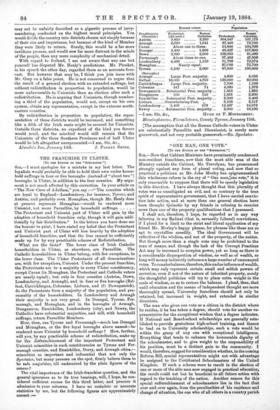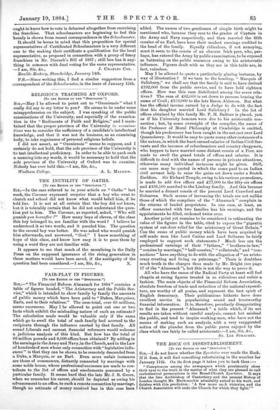"ONE MAN, ONE VOTE."
[To THE EDITOR OF THE " EIPIGTATOR."1
So.,-Now that Cabinet Ministers have prominently condemned non-resident franchises, now that the most able man of the Ministry outside the Cabinet, Mr. Trevelyan, has pronounced. strongly against any form of plural voting, and now that so practical a politican as Mr. John Morley has epigrammatised this wholesome reform in the cry of "One manZone vote," it is only reasonable to suppose that there will be speedy legislation in this direction. I have always thought that this plurality of votes was so unmitigated an evil, and so contrary to the true spirit of representative government, that I have carried convic- tion into action, and at more than one general election have been thought Quixotic by my friends in refusing to exercise more than one of the property qualifications that I possessed.
I shall not, therefore, I hope, be regarded as in any way faltering in my Radical (that is, earnestly Liberal) convictions, If I plead for a limit to the strict and literal application of my friend Mr. Morley's happy phrase, for phrases like these are so apt to crystallise speedily. The ideal Government will be reflective of the wisdom, and not of the property, of the nation. But though more than a single vote may be prohibited to the man of means, and though the lash of the Corrupt Practices Act may be increased to scorpion power, yet so long as there is a considerable disproportion of wisdom, as well as of wealth, so long will money indirectly influence a large number of unmoneyed votes. To counterbalance, therefore, this undue influence of wealth, which may only represent certain small and selfish powers of accretion, even if not of the nature of inherited property, surely the thoughtful politician will try to place extra weight in the scale of wisdom, so as to restore the balance. I plead, then, that until education and the means of independent thought are more thoroughly spread, University franchises should not only be retained, but increased in weight, and extended in similar directions.
The man who gives one vote as a citizen in the district where he resides, if he has taken a degree, should vote for another re- presentative for the exceptional wisdom that a degree indicates. If National and Board-school scholarships are generally esta- blished to provide gratuitous high-school training, and thence to lead on to University scholarships, such a vote would be within the grasp of any one with exceptional intelligence. Everything that tends to enhance the honomsble dignity of the schoolmaster, and to give weight to the responsibility of his position, must be a distinct gain to the community. I would, therefore, suggest for consideration whether, in the coming Reform Bill, special representatives might not with advantage be assigned to the Certificated Schoolmasters of the United Kingdom. If such a scheme were to result in the election of one or more of the able men now engaged in practical education; the result could not but be beneficial to all future action with regard to the teaching of the nation. Another reason for this special enfranchisement of schoolmasters lies in the fact that over and over again, from the peculiarities of his residence and. change of situation, the one who of all others in a country parish
ought to know how to vote is debarred altogether from exercising the franchise. That schoolmasters are beginning to feel this keenly is shown from recent correspondence in the Schoolmaster. It should be borne in mind that this proposition for special representatives of Certificated Schoolmasters is a very different one to the making their certificate a qualification for the local representative, as proposed in connection with a group of fancy franchises in Mr. Disraeli's Bill of 1867; still less has it any- thing in cutamon with dual voting for the same representative.
P.S.—Since writing this, I find a similar suggestion from a .correspondent of the Schoolmaster, in the issue of January 12th.



































 Previous page
Previous page